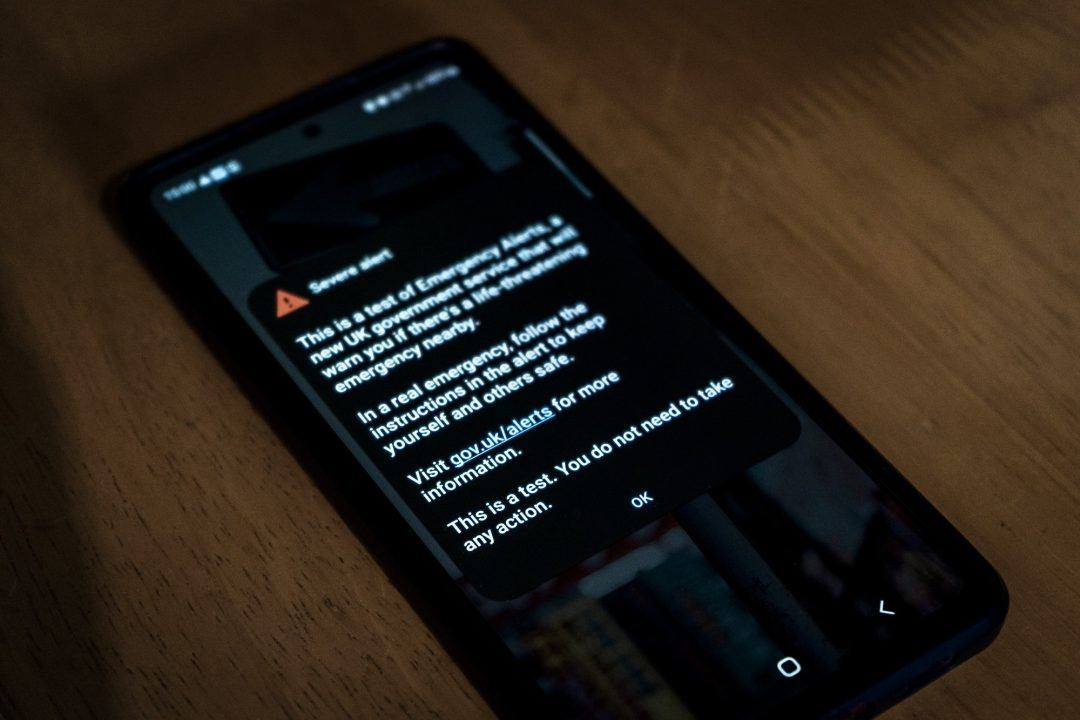The UK Government will carry out a nationwide test of its Emergency Alerts system on Sunday, giving mobile users a brief warning on their phones.
The drill is designed to ensure the system works when it is most needed to keep the public safe during emergencies.
What will happen during the test?
Mobile phones on 4G and 5G networks will vibrate, emit a siren for up to 10 seconds, and display a message confirming the alert is a drill at 3pm on Sunday.
The text of the message will read: “This is a test of Emergency Alerts, a UK government service that will warn you if there’s a life-threatening emergency nearby.
“You do not need to take any action. In a real emergency, follow the instructions in the alert to keep yourself and others safe.
“Find simple and effective advice on how to prepare for emergencies at gov.uk/prepare, external.
Can I opt out?
To opt out, iPhone users should go to settings, search for “Emergency Alerts”, and turn off Severe & Emergency Alerts.
Android users can do the same by searching “Emergency Alerts” in settings and switching off Severe & Emergency Alerts.
How should the public prepare?
Theatre and cinema-goers are being advised to turn off their phones before attending performances.
Society of London Theatre (SOLT) and UK Theatre said its members have been advised about the alert.
A spokesperson said: “Theatres are updating their pre-show announcements to remind audiences to turn phones off completely, helping to minimise disruption.
“Theatre is a uniquely live experience where the unexpected can happen – but it’s always best when the surprises come from the stage.”
Meanwhile, the AA recommends that drivers familiarise themselves with the alert sound and vibration and do not interact with the message until stopped in a safe place with the engine switched off.
Edmund King, AA president, said: “We support the testing of the emergency alerts system, which is an important tool the Government uses to keep people safe in a crisis.
“On the day, drivers should simply stay calm and focus on the road. As always, only check your phone when you’re parked safely with the engine turned off.”
RAC road safety spokesperson Rod Dennis said: “Anyone driving on Sunday afternoon needs to be ready for the 3pm emergency alert test, so we’d encourage people to share the message far and wide with anyone they know.
“The loud siren-like sound that will be emitted by millions of phones is, of course, designed to get everyone’s attention but it’s important drivers stay focused while it’s going off for 10 seconds or so.”
A National Highways spokesperson said: “We are displaying messages on some of our motorway signs to tell motorists about the national emergency alert test on Sunday September 7.
Could the alert cause issues for some people?
Domestic abuse victims could be at risk if the upcoming emergency alert drill sends an alert to any hidden devices they have, charities say.
Emma Pickering, of charity Refuge, said: “During the initial roll-out of the Government’s emergency alert system, Refuge expressed concerns about how the alerts could indirectly impact survivors who have hidden devices by making their abuser aware of the device.
“We must be clear – abuse is always a choice a perpetrator makes, and technology itself is not responsible.
“When used correctly and as intended, technology can make vast improvements to our lives, and we know that having a hidden device that can be used to access support without fear of being tracked can offer a lifeline for many survivors.
“However, in the hands of a perpetrator of abuse, technology becomes another tool to misuse and weaponise, often with devastating effects.”
Who has received alerts in the past?
The UK Government has used the system to issue real warnings five times, including in January during Storm Eowyn to warn people in Scotland and Northern Ireland about severe weather.
Approximately 3.5 million people across Wales and south-west England received an alert during Storm Darragh last December.
A 500kg unexploded Second World War bomb found in a Plymouth back garden triggered a warning to some 50,000 phones in February last year.
And some 15,000 phones were alerted during flooding in Cumbria in May 2024, and 10,000 received a warning during flooding in Leicestershire in January this year.
Messages can be targeted to relatively small areas to pinpoint those at risk.
In the event of a real emergency, the alert would also be transmitted on television, radio and locally by knocking on doors.
Pat McFadden, chancellor of the Duchy of Lancaster, said: “On Sunday September 7, we will hold a UK-wide test of the Emergency Alerts system to ensure it works when we need it most.
“It is a vital tool for keeping the nation safe when lives are on the line – and every minute matters.
“During Storm Darragh and Storm Eowyn, as millions faced dangerous extreme weather, I saw first-hand how effective it was at getting life-saving advice to at-risk communities in an instant.
“We do not use the system often, but like the fire alarm in your home, it is always on standby should we need to act.”
Follow STV News on WhatsApp
Scan the QR code on your mobile device for all the latest news from around the country





























